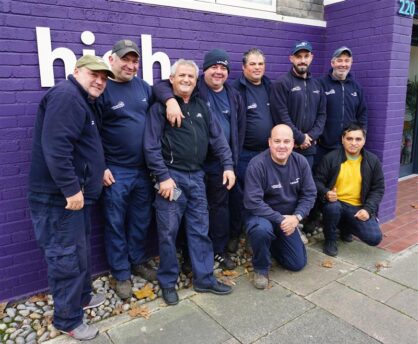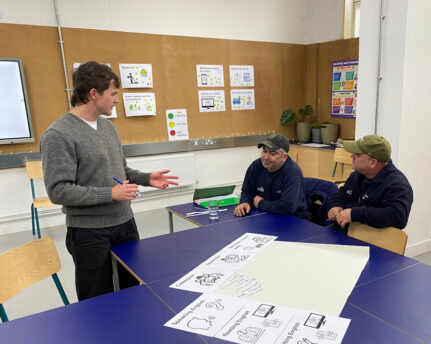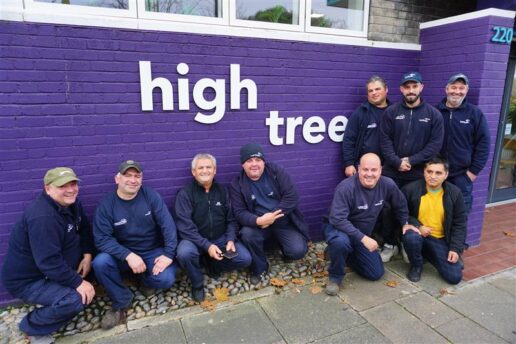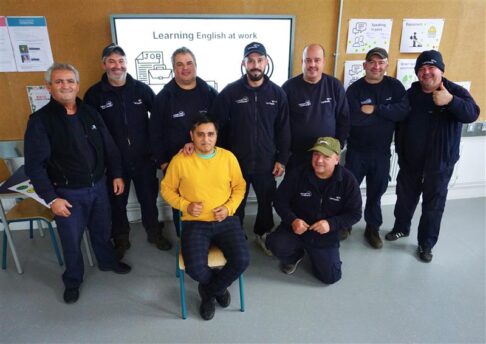In Conversation | ESOL in the Workplace: Making Language Learning Accessible
In this blog, we speak to Harry Jenkins (Senior Researcher) and Elly Townsend (Head of Research & Development) at High Trees about their work, funded by The Bell Foundation, to make ESOL provision more accessible and the exciting findings from their first course.
Over one in five people who speak English as a second or additional language (ESL) do not speak it “well” or “at all”. Attending ESOL (English for Speaking of Other Languages) classes can be life-changing, the key to unlocking opportunities previously off limits due to language barriers.
And yet, for ESL speakers in some areas, attending appropriate or accessible ESOL classes is easier said than done. We spoke to our partner organisation, High Trees, who are looking to change this by making ESOL available in the workplace.
So, could you begin by telling us a bit about your project?
Elly: We’re leading an exciting project which explores the barriers individuals in work face when accessing ESOL. We know, for example, that the timing of classes – typically during the working day – is an issue, and we want to understand this and other challenges in more depth, from the perspective of both learners and employers.
As part of this – and this is really key – we’re also working with employers to pilot new approaches to delivering ESOL, to find new, practical ways of overcoming the barriers being faced.
Ultimately, the learning from this can then be shared with ESOL providers, policy makers, employers and commissioners of ESOL, on how to improve access to ESOL provision more widely.
Our first pilot was with Lambeth Council’s Ground Maintenance Team. We’re really excited to have successfully delivered our first ESOL course tailored specifically for people in work, which ran for 10 weeks between April and July 2024.
This sounds like a really innovative and exciting piece of work! The difficulty in accessing ESOL for some ESL speakers is something we often hear. How did this particular pilot come about?
Elly: We were approached by Lambeth Council Adult Learning to see if we could develop a bespoke course. Members of their Ground Maintenance Team had found it difficult to learn English, facing issues like a lack of time around work because some learners worked multiple jobs or courses being too expensive. In fact, only one of them had studied English before.
At work, they also found it difficult to learn or practice English, as their colleagues spoke the same first language as them such as Portuguese, Albanian and Polish , so, of course, that is the language they tended to use.
As a result, some members of the team found a variety of tasks at work challenging, like interacting with residents on estates, asking their supervisor questions, and reading instructions or emails. By providing ESOL classes, their team manager hoped they would be able to overcome these challenges, and to, in time, be able to access more specialised training.

"I learned to speak. I liked being in the group. I'm happy."Course participant
Do you feel the involvement of an employer made a difference? Was the course tailored to the particular setting in question?
Harry: Yes, the course was actually developed with the team manager and designed not only to enhance their speaking, listening, reading, and writing abilities but also to boost their confidence in using English both at work and in their daily lives.
Topics focused on tasks such as reporting accidents, health and safety, speaking to clients and members of the public – so topics essential to their work setting – with other topics such as the alphabet and numbers introduced as “scaffolding” to prepare them for more advanced areas. The tutor used a variety of activities to support learning in classes, including listening, roleplays, and group exercises.
And has this made a difference so far? How?
Harry: Of the 12 grounds mainte nance operatives on this first course, we have seen a hugely positive change! We’re delighted that all learners reported improved confidence in speaking English after the course, and now felt either “quite” or “very confident” speaking English to a colleague, their supervisor, or a member of the public.
All learners also reported improved confidence in understanding someone else speaking English.
Comparing the pre- and post-course responses, we also saw some very positive outcomes, such as an increase in learners speaking English at work every day, and an increase in learners practicing English on their own after the course.
- 75% of learners reported speaking English every day at work (an increase of 50% from before the course).
- 63% reported practicing English on their own after the course (an increase of 38% from before the course).
And the cherry on the cake, all learners reported feeling more confident and happier, while 88% said they felt safer and 75% more independent!

“They are practicing [at work]. There's a lot of joviality. You can hear them talking to each other, and of course laughing if someone gets something wrong".Team manager
That’s fantastic, and it’s just the beginning! Have there been any learning points that you can take away from this first course?
Elly: Yes, definitely, a few things stood out. Firstly, it was so important to involve the team manager in the design of the course - they were able to identify work-related tasks to focus on, while the tutor and High Trees team incorporated more general learning to underpin these topics and build confidence speaking English outside of the workplace too.
The success of the pilot also relied on the course arrangements. Classes took place outside of the workplace at High Trees’ Hub in Tulse Hill, and operatives attended as part of their usual working hours and were paid their usual salary for the hours they attended. Together with regular communication between High Trees and the team manager, these arrangements encouraged attendance and engagement.

“It's worked better during working hours… we have a shorter day on a Friday, and it doesn't impinge too much on the workload.”, and that “away from the workplace is really good… I think they feel it's a much safer environment, in terms of being able to put themselves out there”.Team manager
Have you made any changes to upcoming courses based on your findings?
Elly: Yes, following feedback from learners, the tutor, and the employer, we’ve updated the course design to incorporate a few new aspects. These include use of materials provided by the employer, such as instruction manuals), use of IT suite for activities linked to reading and writing emails, and also, sharing resources with the team manager to facilitate further practice in the workplace.
Unlike regular ESOL classes, the group of operatives had mixed levels of English, with some also experiencing literacy challenges. So, the tutor tailored in-class activities and homework to different levels as much as possible. The team manager and the High Trees team are exploring options for more intensive support for employees with extra learning needs.
So, after this initial success, what is next on the project’s agenda?
Harry: We have a second course with the same group of grounds maintenance operatives, which started in late September. We plan to then evaluate the adaptations we made and learners’ experience and progress at the end of the course.
As Elly mentioned, we’re also conducting wider research into ESOL for people in work, speaking to individuals in work, employers and ESOL providers to understand the barriers and challenges they each face. The findings will help inform future pilot courses and resources for employers and ESOL providers looking to support people in work to learn English.


